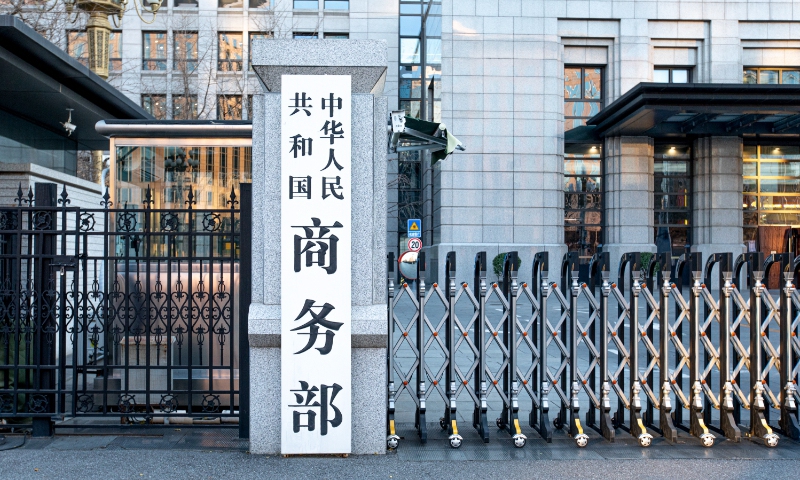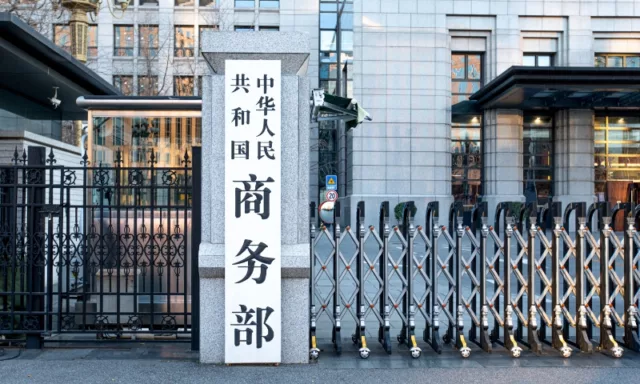
The Ministry of Commerce of China File photo: VCG
Chinese Commerce Minister Wang Wentao met with Hildegard Mueller, president of the German Association of the Automotive Industry (VDA), in Beijing on Sunday, encouraging German automakers to seize the opportunity and strengthen their confidence in investing in China.
During the meeting, Wang noted that the current international situation is complex and severe, pointing to unilateralism and protectionism of certain country. «China and the EU are the two pillars of defending multilateralism and free trade. We hope that the VDA will continue to play an active role and promote Germany and the EU to firmly maintain the multilateral trading system and the stability of the global supply chain,» Wang said, also calling for properly resolving the EU’s anti-subsidy case against China’s electric vehicles (EVs) as soon as possible.
For his part, Mueller said that the automotive industry should adhere to globalization and respond to challenges through openness and cooperation. Blindly imposing tariffs will not contribute to global economic stability, and the association firmly opposes trade protectionism, according to a statement from the Chinese Commerce Ministry.
Europe should urgently deepen its economic and political ties with China, as the country remains a vital partner in countering the «destructive and unpredictable» trade policies of the current US administration, which threaten to «undermine Europe’s stability,» a leading German automotive expert told the Global Times in an exclusive interview.
«The US government wants to destroy Europe. We need a strong partner, and China can be that reliable and powerful partner,» said Ferdinand Dudenhöffer, co-founder and director of the Germany-based Center for Automotive Research at the University of Duisburg-Essen.
The US has imposed sweeping unilateral tariffs targeting multiple trade partners, including a blanket 25 percent levy on all auto imports effective on April 3 and a 25 percent duty on auto parts set to take effect on May 3, sparking widespread opposition at home and abroad.
Europe’s auto exports to the US could fall by slightly more than 20 percent this year, or 200,000 vehicles, if the new 25 percent tariff remains in place for the full year, French automotive consultancy Inovev said, according to Forbes.
European carmakers that manufacture vehicles in the US are more severely affected by Washington’s tariff policies than Chinese carmakers, Dudenhöffer said, stressing the importance of closer cooperation between Europe’s and China’s auto industries to tackle US tariff disruptions and global uncertainties.
Dudenhöffer noted that the new German government is pushing for a cooperative approach with China, particularly in the electric vehicle (EV) sector, which is vital for the development of Germany’s auto industry.
«The future lies in closer collaboration with Chinese companies, as they are fundamentally reshaping the industry,» he noted.
The German expert also highlighted innovations showcased at the ongoing 21st Shanghai International Automobile Industry Exhibition (Auto Shanghai 2025), including BYD’s EVs, CATL’s batteries, and Huawei’s operating systems, as representing the industry’s future direction.
Chinese brands led the charge in vehicle intelligence, with 97 new models debuting at Auto Shanghai 2025, which runs from Wednesday to May 2, the Xinhua News Agency reported, citing a report by Kaiyuan Securities.
China has firmly established itself as an automotive superpower and even US tariffs won’t change this reality, Dudenhöffer emphasized, highlighting China’s «clear competitive edge» in advanced driver assistance systems, in-car entertainment and navigation features, which he called «an almost unbeatable combination of innovation and cost efficiency.»
US tariff policies could end up accelerating China’s auto industry growth through innovation and scale, and prompt German automakers like BMW and Mercedes to shift more production to China, as building SUVs in the US for global export would no longer be cost-effective, according to Dudenhöffer.
German and Chinese companies are forging increasingly successful partnerships. In a recent development, BMW announced in March that it will collaborate with Chinese tech giant Huawei to develop an in-car digital ecosystem specifically tailored for the Chinese market, per a Xinhua report.
Mercedes-Benz CEO Ola Källenius said on Wednesday that the German automaker was urging the EU to find an «equitable solution» to create a level playing field for China-made EVs in Europe, saying that «we need to seek win wins… But a pure tariff barrier is the crudest instrument you can apply,» Reuters reported.
German firms are highly interested in the Chinese market because their success depends on engagement with the world’s largest auto market and increasingly with Chinese technology, according to Dudenhöffer.
«If you want to design, develop and engineer the car of the future, it must be done in China, as only China has the necessary level of digitalization and battery expertise,» he said. «To succeed in the next era of mobility, we must deepen our engagement with China.»
Dudenhöffer also praised China’s growing openness to foreign visitors and businesses, highlighting its visa-free policy and simplified entry procedures. «China is very open to us, and it’s very easy to travel there, which is very different from entering the US,» he said.
Dudenhöffer also expressed strong confidence in China-Europe negotiations regarding auto tariffs. «I am quite sure that we will return to a ‘no-tariff era’ in the automotive sector between China and the EU, as these tariffs are not only hurting Chinese carmakers but our own as well,» he said.
The German expert highlighted the vast potential for China-EU trade and economic cooperation, stressing that the main barriers lie with «some politicians» but that the industry is «doing very well.» He called on policymakers to rebuild political trust by «going into negotiation and talks» instead of imposing tariffs that have been proven to hurt the EU car industry.
Europeans, especially Germans, also need to better understand China, Dudenhöffer said, noting that seeing China firsthand offers «a very different picture» from often negative media portrayals.
Dudenhöffer added that greater people-to-people and business exchanges will help people realize that while the US poses challenges, China offers major opportunities.









